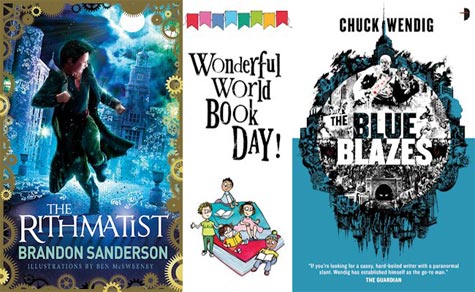Once upon a time, Wednesdays were difficult days… slap bang in the middle of the working week, with no redeeming qualities at all. But those dark ages are finally over, because now, Wednesdays are all about the British Genre Fiction Focus, Tor.com’s weekly column dedicated to news and new releases from the United Kingdom’s thriving speculative fiction industry.
Leading the news this week, a potentially fascinating article about the possibilities of interactive fiction, disdainfully framed, I’m afraid, by a correspondent who takes pains to conflate fantasy authors with amateurs.
I’m sorry, but what?
After that, it looks like someone’s raised the floodgates again, because a bunch of events of particular interest to genre fiction fans have been announced since last we did this thing. And hey, last Thursday was World Book Day! There was an app and everything. Last but not least in the news… do I have some lovely covers for you? Why yes. Yes I do.
This week’s new releases include the latest from Adam Baker, the final instalment of Cassandra Clare’s Infernal Devices series, the Misspent Youth of Peter F. Hamilton and a fantastical family saga by Whitbread Award-winner Kate Atkinson. And that’s just for starters!
NEWS
The Interactive Future of Fiction
It’s always seemed to me that ebooks are missing a trick. Though a few forward-thinking publishers have taken to appending extra content in their digital editions, most ebooks are exactly that: electronic versions of printed products. No more, and all too often a lot less.
I suppose my overwhelming preference for physical editions makes me out to be something of a luddite, but let’s be completely clear here: it’s not that I’m at all averse to reading ebooks, it’s just that I don’t see a good reason why I should sacrifice the satisfying feeling of pages diminishing beneath my fingers, or the inherent preciousness of the printed page. Of course the convenience of an ebook reader appeals to me—to wit, I do have one, and it’s awfully handy when I’m on holiday—but on a day-to-day basis, for me at least, the trade-offs I’d have to make to move over entirely remain too great.
That said, there are so many ways we could make the e-book better, not to mention more appealing to cavemen such as yours truly. A Last Time In The Book You’re Reading feature would be invaluable, and reasonably easy to implement. I dare say a decent Read Aloud feature is doable too. But I’ve already blogged about these ideas in greater detail on The Speculative Scotsman, so let’s get on with the article that sparked this diatribe.
Sadly, it begins… badly:
Online fiction is a remote world, peopled by elves, dragons and whey-faced vampires. At least that is the view shared by millions of devoted readers of the printed novel. But now serious British literary talent is aiming to colonise territory occupied until now by fantasy authors and amateur fan-fiction writers.
Reading this paragraph for the first time, I literally did a double-take at that last leap of logic, sure that I’d missed something significant. But no. Though The Observer’s arts and media correspondent Vanessa Thorpe does sort of qualify her statement by implying that millions of idiots also think along these lines—and perhaps they do, though I’m dubious—at the very least there’s the implication that “fantasy authors” and “amateur fan-fiction writers” are basically the same.
Excuse me?
If that doesn’t make you angry in itself, just wait, because it gets worse. Leaving aside the idea that fantasy is practically fan-fiction, because otherwise I’m not going to be able to finish composing this column, how does the implicit opposition of “fantasy authors” and “serious British literary talent” sit with you?
I suppose we are to take it that one of these things is not like the other. That we shouldn’t kid ourselves into thinking that even the best authors working within the genre can be considered alongside “serious British literary talent” like—to use Thorpe’s counterpoint—historical novelist Iain Pears?
And the closer I looked at this single sentence, the more offended I felt. Simply consider the connotations of the idea that fantasy authors (not to mention their pals the amateurs) currently “occupy” this “territory.” That what the untamed wilderness of online fiction needs is a nice bit of colonisation.
So there you have it, folks: genre fiction is at war with proper English literature!
And all this in service of a preamble that has next to nothing to do with the subject supposedly under discussion.
I would love to have a serious conversation about the e-books of tomorrow’s world, but by going out of her way to exclude folks such as us from this future, I’m afraid the author of the originating essay has managed to entirely derail this discussion.
How about we try again?
The Interactive Future of Fiction, Take Two
Now without abhorrent snobbery!
Aside from the antagonistic introduction analysed above, Thorpe’s account of the potential evolution of the ebook has the makings of a great debate.
The aforementioned article goes on:
In the vanguard [of the war on fantasy and fan-fiction] is Iain Pears, the best-selling historical novelist and author of An Instance of the Fingerpost and Stone’s Fall. Pears will offer readers the chance to go back to check detailed elements of his narrative and will even flag up sections they do not have to read. “I am trying to find a new way of telling stories, and once you start thinking about it, there are almost too many possibilities,” said the Oxford-based writer, who is completing an interactive ebook for Faber that will stretch the form to its current limits. “There is no reason to think the printed book will be the defining literary format. I don’t want to be cautious any more. This is about changing the fundamentals. The worst that can happen is that it won’t work.”
It is a challenge that also intrigues acclaimed authors Blake Morrison and Will Self, although they detect some obstacles. As professor of creative writing at Goldsmiths College, at the University of London, Morrison has just launched a £10,000 prize for innovative new writing and argues that the success of experimental ebooks will depend on making interactivity more than just a feature. “Reading by its very nature is interactive—whether you do it on an iPad or with a printed book, you participate,” he said. “The novelist creates a world and the reader brings something to it. Reading is not a passive process. Literary interactivity means more than computer games. Or should do.”
Oh no. Blake Morrison didn’t just take a pot shot at video games, did he?
Tell you what: I’m going to pretend I didn’t catch that.
Moving on, there are, I think, some very interesting ideas here. Later in the essay, Victoria Barnsley of HarperCollins talks about incorporating alternate endings into certain texts, in (I can only imagine) the mode of the Choose Your Own Adventure novels of yore. She also moots the thought that we could use GPS-based data to tailor-make tales.
Both of these suggestions make me feel… somewhat uncomfortable. But of course the unknown is almost always unappealing; I suppose I could come around if these things were well executed.
So where do you see the ebook in, oh, ten years or so? Will it have replaced the printed page completely, or will the warring formats have found a way to co-exist?
Meanwhile, what would you like to see in the digital editions of the future? And equally, which innovations would send you running back to physical literature?
For the very moment, Blake Morrison encapsulates my feelings exactly:
Morrison sees the possibilities opened up by interactive books, but will not give up on the printed page. “I don’t see this as a war between old and new, between the fustiness of print and the excitement of reading on Kindles and iPads,” he said. “Most authors are interested in both technologies. Most readers are too. We all want the best of both worlds. And why not?”
Well said, sir!
Cover Art Corner: What in The Blue Blazes is The Rithmatist?
This week, I’ve got two very different images to showcase in Cover Art Corner, one of which looks lovely in the classic fashion, whilst the other is equally appealing, though rather more modern.
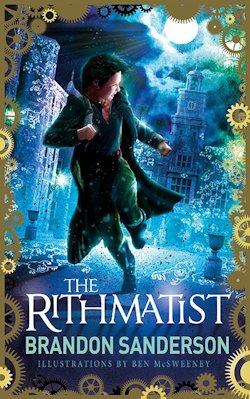
On the right you’ll find the former, which is to say the very pretty picture—designed by Jamie Tanner—that will be emblazoned on British editions of The Rithmatist by fantasy mastermind Brandon Sanderson, and featuring illustrations by Ben McSweeney.
Here’s that young adult book’s blurb:
Someone is killing the powerful Rithmatist magicians and Joel may be the only one who can stop the killer….
Joel is fascinated by the magical art of Rithmatics, but unfortunately only a chosen few have the necessary gift and Joel is not one of them. Undaunted, Joel persuades Professor Fitch to teach him Rithmatic theory—and soon finds that his knowledge is put to the test when someone starts murdering the top Rithmatic students at his school.
But can Joel work out the identity of the killer and stop them before they realize just what a threat Joel actually is?
In the UK, The Rithmatist will be published by the children’s division of Gollancz’s parent group, Orion Books, on May 16th, and I confess I’m counting down the days. There are only 64 more to go!
A few weeks later, Chuck Wendig’s new novel will be upon us. It’s called The Blue Blazes, and the fine folks at Angry Robot lately unveiled its UK cover art by way of this exclusive reveal over at The Founding Fields.
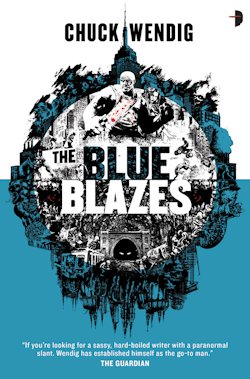
You want a synopsis? I’ve got a synopsis!
Meet Mookie Pearl.
Criminal underworld? He runs in it.
Supernatural underworld? He hunts in it.
Nothing stops Mookie when he’s on the job.
But when his daughter takes up arms and opposes him, something’s gotta give….
I like this cover art a lot—but of course I do! It’s by Joey Hi-Fi—though I don’t know that I’d go quite so far as the author did when Shadowhawk asked his thoughts:
“I have no thoughts because my brain is not capable of processing such an artsplosion of awesomeness. Or an awesplosion of artfulness. I mean, you’re telling me I won the cover lottery and have Joey Hi-Fi (who did both the Blackbirds and Mockingbird covers) decorating my book again? I am lactating with the milky nourishment of joy.”
Okay….
Be that as it may, this is certainly a striking image. Look out for the physical edition of The Blue Blazes come June 6th in Great Britain.
But what am I talking about? You’re hardly going to miss it with that cover art!
Destination: London, Largely
It feels strange to say this, given how rarely great things happen here, but the UK looks like the place to be for speculative fiction fans in the next couple of months.
A whole host of especially exciting events have been announced in recent weeks, and I figured a few of my fellow Brits might find a round-up of all that there is to look forward to rather handy. If you’re reading from further afield… sorry! Maybe think of this as a short survey of some the good stuff you’re missing?
Let’s start with the showstopper: on April 3rd, according to Orbit, the one and only Terry Brooks will be signing copies of his new series, The Dark Legacy of Shannara, at the London Megastore branch of Forbidden Planet. This marks the first time Terry Brooks has held an event in the UK for more than five years, and who knows when the opportunity to meet this master will present itself again? Fans had best be ready.

If Terry Brooks doesn’t do it for you, then loads of other genre authors will be stopping off at the Megastore in the coming months. Indeed, Paul Cornell’s going to be there later today, while Cory Doctorow will be meeting and greeting a week on Saturday. In April, a veritable onslaught of authors have signings scheduled, including Adam Christopher, Ian Whates, Chris Beckett, Mike Carey, Jeff Noon and Lauren Beukes. And in May? Expect none other than Raymond E. Feist.
You can find more details on all of the events aforementioned on Forbidden Planet’s website.
As if that weren’t enough, the organisers of The Kitschies have just announced their next shindig. Starring Warren Ellis, Benjamin Percy and Lauren Beukes—snap!—Storytelling Without Limits will be held at the Brixton Ritzy on April 30th, and it promises to be “an evening of discussion, debate and a bit of tentacular fun.”
All three authors are storytellers that span genres and formats alike—from novels to comics to films to documentaries to short stories to journalism to Twitter to children’s cartoon series, these are writers that work without boundaries.
How does the platform change the story? How do you move a story from one media to another? What are the challenges and strengths that come with each? Also, what are you working on, what’s your inspiration and do you sign body parts?
Storytelling Without Limits features a unique show-and-tell, as well as a discussion between the three writers. A Q&A and signing opportunities to follow.
Lucky bloody Londoners!
Last but not least, the seventh annual London Literature Festival will take place at the Southbank Centre from May 20th through June 5th, and The Bookseller reports that we can anticipate an appearance from Audrey Niffenegger, author of The Time Traveler’s Wife, in support of her new novella The Raven Girl, which Jonathan Cape are publishing in the UK in early May.
Oh! A certain Mr. Mieville will apparently be there as well.
For more information about the London Literature Festival, pop across to the Southbank Centre’s website.
All that, and I haven’t even made mention of the multitudes attending Eastercon!
Well… I suppose we’ll talk about that in due course, won’t we?
Yay for World Book Day

I am reliably informed that last Thursday was World Book Day 2013, and to my shame, I forgot all about it in the process of putting together the previous edition of the British Genre Fiction Focus. Before reminding me of my oversight, the kids I teach when I’m not blogging for Tor.com or TSS looked at me curiously during that day’s classes, surprised that I hadn’t contrived an exercise based on the big day in some way.
Well, better late than never, eh?
In case you’re wondering what a World Book Day is:
World Book Day is a celebration! It’s a celebration of authors, illustrators, books and (most importantly) it’s a celebration of reading. In fact, it’s the biggest celebration of its kind, designated by UNESCO as a worldwide celebration of books and reading, and marked in over 100 countries all over the world.
Though we may have missed out on the celebration itself, all of the books and stories published to tie in with the 16th successive World Book Day remain available. Find out about the eight exclusive novels here.
You ask me, the line-up’s a little lean this year.
Of markedly more interest to speculative fiction fans, I imagine, there’s an app available from both the iOS Store and the Android Marketplace. It might take some finagling to access if you live outside of Great Britain, but it’s got to be worth going the extra mile, not least because it contains nine new short stories by a number of notable genre authors, including Patrick Ness, author of The Chaos Walking Trilogy—as well as the The Crane Wife, a truly wonderful new book coming from Canongate in the UK—Josephine Angelini, Sarah J. Maas and Will Hill, whose third Department 19 novel is due in just a few.
Speaking of being late for a very important date, let’s begin our usual overview of the week in new releases with yet another book I managed to overlook.
NEW RELEASES

Seoul Survivors, by Naomi Foyle (February 28, Jo Fletcher Books)
A meteor known as Lucifer’s Hammer is about to wreak destruction on the earth, and with the end of the world imminent, there is only one safe place to be. In the mountains above Seoul, American-Korean bio-engineer Dr Kim Da Mi thinks she has found the perfect solution to save the human race. But her methods are strange and her business partner, Johnny Sandman, is not exactly the type of person anyone would want to mix with.
Drawn in by their smiles and pretty promises, Sydney—a Canadian model trying to escape an unhappy past—is an integral part of their scheme, until she realises that the quest for perfection comes at an impossible price.

Life After Life, by Kate Atkinson (March 14, Doubleday)
What if you had the chance to live your life again and again, until you finally got it right?
During a snowstorm in England in 1910, a baby is born and dies before she can take her first breath.
During a snowstorm in England in 1910, the same baby is born and lives to tell the tale.
What if there were second chances? And third chances? In fact an infinite number of chances to live your life? Would you eventually be able to save the world from its own inevitable destiny? And would you even want to?
Life After Life follows Ursula Todd as she lives through the turbulent events of the last century again and again. With wit and compassion, Kate Atkinson finds warmth even in life’s bleakest moments, and shows an extraordinary ability to evoke the past. Here she is at her most profound and inventive, in a novel that celebrates the best and worst of ourselves.

Misspent Youth, by Peter F. Hamilton (March 14, Tor UK)
Jeff Baker is a legend. He’s an internationally-renowned inventor and philanthropist extraordinaire, and at 78 years old he’s given the world much of his genius. So in 2040, when Europe can finally rejuvenate a human being after decades of research, Baker becomes first choice for the gift of youth. And after eighteen months in a German medical facility, Jeff returns home looking no more than twenty.
The successful rejuvenation feels like a miracle—until the glow starts to fade. Jeff’s relationship with his ex-model wife changes drastically. He also sees his son Tim, and Tim’s gorgeous girlfriend, in a whole new light. As his pensioner friends start to resent what Jeff has become, he becomes increasingly aware that the world is watching. After all, great gifts come at a price and he will be expected to contribute yet more brilliant research to justify his place in the history books.
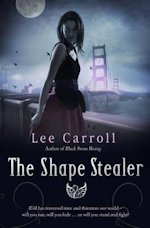
The Shape Stealer (Black Swan Rising #3), by Lee Carroll (March 14, Bantam Press)
Garet James and Will Hughes find themselves back in 21st century Paris, each with an unusual romantic quandary. The 400 year-old remorseful vampire that Garet still loves remains trapped in time, in 1602, as is Marguerite, the young Will’s love, who might reconsider her decision to reject him now that he has become an unvampire. Their time reversing prospects include guidance from the Institut Chronologique and from another time-traveller, the astronomer Johannes Kepler who Will encounters on one of the bridges across the Seine. It is by no means an easy task. And complicating things further is the fact that they appear to have brought with them a monster from the past: the shape-shifting, blood-drinking Marduk.
They set out to find Marduk, but it’s not easy to find a creature who can change shape at will. When they realize that Marduk has not only stolen Will Hughes’ face, but also his identity, they fear that he has teamed up with their old nemeses John Dee and Cosimo Ruggieri to gain control of—and destroy—the world’s financial markets. And when they learn that Marduk is on his way to New York, Garet fears that her family and friends will be his next target. Will and Garet leave Paris for New York, where they also hope to resolve their own romantic dilemmas. Which Will does Garet really love? The innocent young man—or the man wracked with remorse for his history of violence and bloodshed? And does Will still love Marguerite? Or has he fallen in love with her time-travelling descendant?

Terminus, by Adam Baker (March 14, Hodder)
The world has been over-run by a lethal infection. Humanity ravaged by a pathogen that leaves victims demented, mutated, locked half-way between life and death. Major cities have been bombed. Manhattan has been reduced to radioactive rubble.
A rescue squad enters the subway tunnels beneath New York. The squad are searching for Dr Conrad Ekks, head of a research team charged with synthesising an antidote to the lethal virus. Ekks and his team took refuge in Fenwick Street, an abandoned subway station, hours before a tactical nuclear weapon levelled Manhattan. The squad battle floodwaters and lethal radiation as they search the tunnels for Ekks and his team. They confront infected, irradiated survivors as they struggle to locate a cure to the disease that threatens to extinguish the human race.
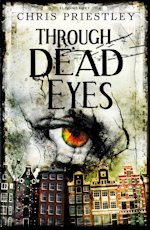
Through Dead Eyes, by Chris Priestley (March 14, Bloomsbury)
Alex joins his father on a business trip to Amsterdam. During the day he hangs out with the daughter of a family friend. They visit the usual sights but also coffee shops and flea markets off the beaten track. At one of these markets Alex spots an ancient-looking mask. Before he knows what he’s doing, he buys it.
Later, in his hotel room, he feels compelled to put the mask on. Alex is sucked into a parallel Amsterdam, one from centuries before which begins to reveal the dark past of both the building he is staying in and the little girl who once lived there… edging stealthily towards the terrible twist.

Zom-B City (Zom-B #3), by Darren Shan (March 14, Simon & Schuster)
After escaping a secret military complex amid the zombie apocalypse, B roams the streets of a very changed London, dirty and dangerous and eerily quiet, except for the shuffling of the undead. Once again, B must find a way to survive against brain-eating zombies—and now also against those who have seized control of the city.
With danger lurking around every corner and no one to trust, B must decide whether to join the creepy Mr. Dowling in exchange for his protection. When everyone around you is dead, where do you turn for help?

Clockwork Princess (Infernal Devices #3), by Cassandra Clare (March 19, Walker)
If the only way to save the world was to destroy what you loved most, would you do it?
The clock is ticking. Everyone must choose.
Passion. Power. Secrets. Enchantment.
Danger closes in around the Shadowhunters in the third and final instalment of the bestselling Infernal Devices trilogy.
POSTSCRIPT
If I could only buy one new book this week, it would be Life After Life: an incredible novel which I recently read for review right here on Tor.com.
Luckily, I’m going to be enjoying some time off shortly, so I might just manage to squeeze in a bit of belated Adam Baker—I haven’t read him yet, but great things are all I hear—and potentially some Seoul Survivors too, not least because of the oddly topical synopsis.
So did any of this week’s new releases get your attention?
No news in brief this week, because I’m about to pop off on an impromptu holiday! But never fear… I’ll be back with another edition of the British Genre Fiction Focus next Wednesday. Same bat-time, same bat-place, shall we say?
Upon my return, I’m particularly looking forward to hearing everyone’s thoughts on the future of the ebook, as well as regarding the rant we began today’s edition with. My goat was obviously gotten. Yours too?
Niall Alexander is an erstwhile English teacher who reads and writes about all things weird and wonderful for The Speculative Scotsman, Strange Horizons, and Tor.com, where he contributes a weekly column concerned with news and new releases in the UK called the British Genre Fiction Focus, and co-curates the Short Fiction Spotlight. On rare occasion he’s been seen to tweet about books, too.










